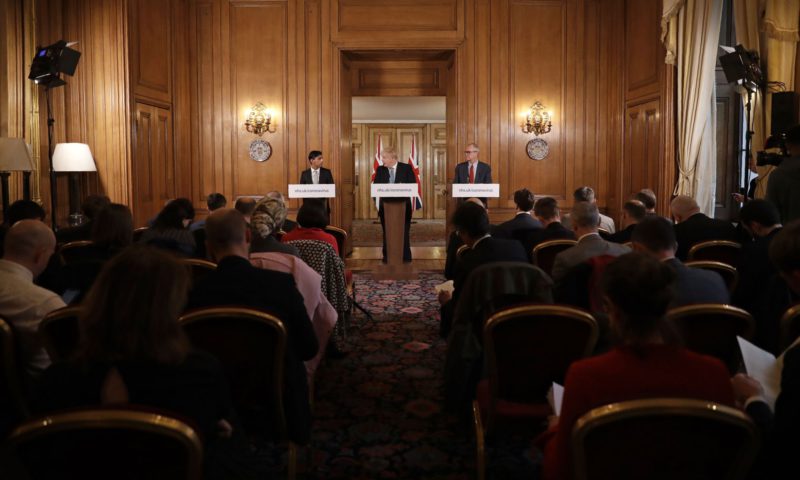Freeing politics from the grip of ‘the lobby’
Tue 10:24 am +01:00, 7 Jul 2020No10’s plan for daily televised briefings shatters the hold a clique of political journalists have had over British politics.
LIAM DEACON
The UK government is to begin White House-style daily televised news briefings. A government spokesperson, yet to be named, will speak directly to the nation via a livestream, which can be accessed by everyone, rather than just a club of elite ‘lobby journalists’ in behind-closed-door meetings.
‘The lobby’ refers to the select group of journalists permitted to mingle with MPs in the Members’ Lobby of the Houses of Parliament. It is not something most voters will be familiar with. But it matters, as it has been one of the most significant vehicles by which British governments have communicated with the public for many decades. And it is well overdue some scrutiny. This obscure system, like many things in Westminster, dates back at least over 150 years and, until the premiership of Harold Wilson in the 1960s, members had been compelled to keep its very existence a secret. Only after John Major took power were reporters allowed to attribute information from these secretive meetings to a ‘Downing Street source’. The lobby spokesman, currently former Daily Mail political editor James Slack, was named for the first time just last year.
I bumped into the reporter concerned the next morning, as he returned, white faced, to his office, after being mobbed and picked on for merely doing his job. The Westminster bubble was rattled and there were efforts to have Guido Fawkes ejected from the lobby altogether. An older reporter from a major news agency, who liked to introduce himself as ‘from the lobby’, even described the blogger responsible as a ‘little idiot’ when talking to me outside the Westminster Arms. Reporters, you see, spend years cosying up to editors and learning the right codes of behaviour before they can use the title ‘lobby journalist’ and access the constant stream of exclusive stories lobby membership affords. Many, therefore, weren’t pleased that everyone on Twitter now also knew what was being said, as it was said. Fortunately Downing Street soon signalled that it did not mind the Guido Fawkes tweets, and the lobby enforcers had to stand down.
When the daily Coronavirus news briefings began six month later, we saw that an alternative way of communicating with the public was possible. I would also hazard a guess that Downing Street has enjoyed watching the likes of Beth Rigby and Robert Peston make a fool of themselves every afternoon.
Nevertheless, the government’s decision to hold daily, televised news briefings has been a long time coming. New Labour press secretary Alistair Campbell allowed some briefings to go on the record in the late 1990s; transcripts have been published online since 2000; and televised briefings have been increasing in frequency for several years. To persist with the lobby system was becoming unsustainable, not least because the public was increasingly bypassing mainstream media, and accessing news through social media.
Defenders of the lobby system say it allows reporters to consider all the information, including the questions and answers at the end, before the frenzy and rush of reporting begins. Labour MP Chris Bryant MP has said that because we have a parliamentary system, not a presidential one, parliament should be addressed before the press or the nation. These are valid points, but 24-hour ‘live’ journalism is already a reality and parliamentary scrutiny can be maintained alongside effective public communication.
Other, more opportunistic, critics have called the move ‘Trumpian’, populist and even Orwellian. This is driven, in the main, by the snobbish idea that middle-class journalists with humanities degrees must mediate information before exposing the uneducated masses to it.
Defenders of the lobby system frequently indulge in double standards. Hence, in February, several reporters loudly boycotted a Downing Street briefing to protest against the government’s decision not to invite certain newspapers. This selective group of lobby hacks objected to the ‘selective’ nature of the briefing and said it posed a threat to transparency. Yet now many of these one-time critics are criticising the government’s decision precisely to make the briefings more public and more transparent.
Indeed, I used to run the Brexit Party’s press desk, and I believe it would not have enjoyed the limited success it did if it had been forced to rely on almost universally hostile journalists to communicate its message. Instead, we built a movement by speaking directly to voters in videos, tweets, and through our newspaper-like newsletter, the Brexiteer. We could not be ignored or silenced by the media and they hated it.
It was, however, the Labour-left campaign group, Momentum, that was the true pioneer here. When the media refused to take either it or former leader Jeremy Corbyn seriously, it bypassed them, and was rightly praised for reaching new groups of young people. If Downing Street’s aim, through the daily news briefings, is to increase engagement with voters, then it is similarly laudable.
Still, it is in general a positive move that will enable us all to listen to everything Downing Street has to say on radio, Facebook Live, or TV, free of the selective editing of a small clique of privileged journalists. Some of the best journalism nowadays is done by ‘normal people’, with only a smartphone and internet access. Hopefully the daily briefings will encourage the further democratisation of political news, which has hitherto been held hostage by the lobby.
Liam Deacon is the Brexit Party’s former head of press.



